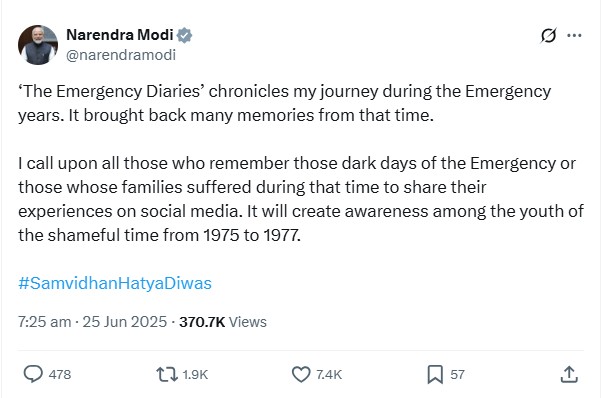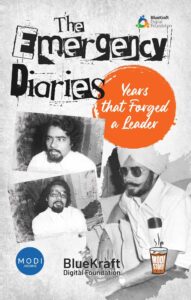
The Emergency Diaries: Marking the 50th anniversary of the Emergency period (1975–77), Prime Minister Narendra Modi today announced the release of a new book titled The Emergency Diaries, a deeply personal and historical account of one of India’s most critical political periods. The book offers insights into Modi’s experiences during the Emergency, shedding light on how those years helped shape his democratic ideals and leadership approach.
The Prime Minister made the announcement via a post on social media platform X (formerly Twitter), stating, “‘The Emergency Diaries’ chronicles my journey during the Emergency years. It brought back many memories from that time. I call upon all those who remember those dark days or whose families suffered to share their experiences. It will create awareness among the youth about the shameful time from 1975 to 1977.”

When the Emergency was declared on June 25, 1975, PM Modi was a young RSS Pracharak. He actively participated in the underground movement against the then-Congress government’s crackdown on civil liberties. According to him, the period was not only a test of resilience but also a moment of political learning.
“The anti-Emergency movement was a learning experience for me. It reaffirmed the vitality of preserving our democratic framework. I got to learn so much from people across the political spectrum,” Modi added.
About the Book: ‘The Emergency Diaries’
The book features first-person accounts, previously unreleased archival materials, and narratives from individuals who worked alongside Modi during that turbulent period. The foreword is penned by former Prime Minister H.D. Deve Gowda, a prominent figure in the anti-Emergency movement.
The Emergency Diaries is the first-of-its-kind effort to create “new scholarship on the formative years of a young man who would go on to become one of India’s most transformative leaders.”

In their official statement, the Foundation noted: “The Emergency Diaries paints a vivid picture of Narendra Modi fighting for the ideals of democracy. This book is a tribute to the grit of those who refused to be silenced. It provides a rare glimpse into the trials that forged his leadership.”
Union Home Minister Amit Shah is scheduled to officially launch the book at an event later this evening in New Delhi.
Emergency Remembered: Samvidhan Hatya Divas
On this solemn occasion, the Prime Minister also referred to June 25 as Samvidhan Hatya Divas (Constitutional Murder Day). In another post, he wrote, “On this day, the values of the Indian Constitution were set aside. Fundamental rights were suspended, press freedom was extinguished, and thousands were jailed — political leaders, students, social workers, and ordinary citizens.”
He criticised the Congress government of the time for undermining democratic institutions. “No Indian will forget how democracy was strangled. The voice of Parliament was silenced, and courts were attempted to be controlled. The 42nd Amendment is a prime example of such shenanigans,” he said.
Modi further lauded the courage of individuals from all walks of life who stood against tyranny. “These were people from across India, from diverse ideologies, who united to protect democracy. Their collective effort forced the then government to call for elections, which they lost badly,” he added.
The book release also serves as a call to the younger generation to remain vigilant and informed. Modi emphasized, “We must strengthen our commitment to constitutional principles and ensure that the dreams of our freedom fighters are not forgotten.”
The Emergency Diaries and the Historical Context: The Emergency of 1975
The Emergency, declared by then Prime Minister Indira Gandhi, was one of the darkest periods in Indian democracy. Civil liberties were suspended, press was censored, and opposition leaders were imprisoned. Over 100,000 people were jailed without trial. In the aftermath, the Congress party faced a massive electoral defeat in 1977, and the Janata Party came to power.
The book The Emergency Diaries provides rare personal insights and historical perspectives on this critical phase. Through first-person narratives and archival material, it captures the resilience of those who resisted the authoritarian regime and preserved the democratic spirit of India.














